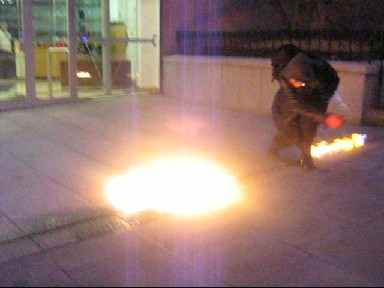 Today is January 4th 2008.
Today is January 4th 2008.
On this day in 1993, 300,000 people in Nigeria marked the United Nations Year of Indigenous Peoples by protesting against Shell’s activities and the environmental destruction of Ogoniland in the Niger Delta.
2008 was supposed to be the deadline for the ending of gas flaring by Shell in Nigeria, but the company now says that this deadline will not be met.
Letting the company have a taste of its own medicine
At just before 8.30 this morning, as staff were arriving for work at Royal Dutch Shell’s Irish headquarters in Dublin, they were treated to a taste of what life is like for those who have to live and work near Shell installations in other parts of the world.
Short version of video (45 seconds) here: http://ie.youtube.com/watch?v=u4uZDvA5WY4
Long version (2 minute) here: http://ie.youtube.com/watch?v=597hkm9MuTo
More information on Shell in Nigeria here: http://www.foeeurope.org/press/2007/May3_DU_Flaring.htm
Gas Flaring is simply the releasing of excess gas and liquids associated with oil and gas production pipelines and refineries into the atmosphere. The main purpose of gas flaring is to protect pipelines and infrastructure from over-pressuring
The released gases are burned off, releasing any by-products into the air. These include nitrogen dioxide, sulphur dioxide, and volatile organic compounds like xylene and hydrogen sulfide. Carcinogens such as benzapyrene are also released. People exposed to these substances can suffer from a variety of respiratory problems, which have been reported amongst many children in the Niger Delta but have but have never been systemically investigated. These chemicals can also aggravate asthma, cause breathing difficulties and pain, as well as chronic bronchitis.
Benzene, which is known to be emitted from gas flares in undocumented quantities, is acknowledged as being a causative agent for leukemia.
Gas flaring of course, also contributes to global warming and climate change.
Together with oil spills, gas flaring is seen as a major cause of environmental degradation. In Nigeria, the practice is supposed to be illegal, but there is no sign of the Nigerian government being able to enforce this law. Here in Ireland we know all about how Shell can manipulate the world of politics and the legal process to suit the needs of the company’s shareholders.
In Nigeria in 1995 however, it appears that Shell’s PR people slowly realised that their part in the hanging of Ken Saro Wiwa and eight other activists was a public relations disaster, and in the aftermath the company made various concessions to its critics, in a vain attempt to undue some of the damage it felt had been done to its brand. One of the promises made was the announcement of an end to gas flaring.
Shell of course, is not well known for living up to its promises, and so flaring is still going on today. In the year 2000, Shell formally announced that it would stop gas flaring by 2008. Interestingly, since 2000, gas flaring in the Niger Delta has actually increased (according to the 2005 Shell Sustainability Report).
In November 2005, the Federal High Court of Nigeria stated that Shell and other oil companies
should end gas flaring in the Niger Delta. In a case brought against Shell, the court ruled that the damaging and wasteful practice of flaring could not lawfully continue and must stop. Shell appealed against the decision.
At the demonstration on January 4th 1993, an Ogoni elder said:
“We have woken up to find our lands devastated by agents of death called oil companies. Our atmosphere has been totally polluted, our lands degraded, our waters contaminated, our trees poisoned, so much so that our flora and fauna have virtually disappeared”.
January 4th became known as Ogoni Day.
For more information see:
www.remembersarowiwa.com
